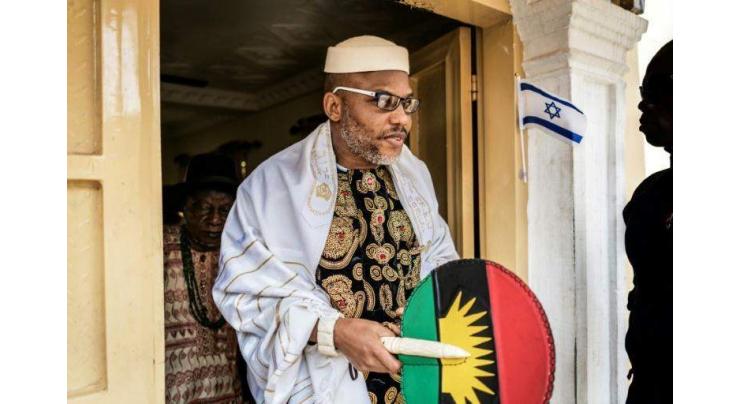
Nigeria Separatist Snatched From Kenya: Lawyers
Umer Jamshaid Published July 17, 2021 | 09:44 PM

A Nigerian separatist leader arrested last month and brought back to his country to face trial was detained illegally in Kenya and needs medical help, his wife and lawyers have said
Lagos, (APP - UrduPoint / Pakistan Point News - 17th Jul, 2021 ) :A Nigerian separatist leader arrested last month and brought back to his country to face trial was detained illegally in Kenya and needs medical help, his wife and lawyers have said.
Nnamdi Kanu's outlawed movement, the Indigenous People of Biafra (IPOB), which agitates for a separate Biafran state for ethnic Igbos in southeast Nigeria, has been accused of attacks on police, a charge it denies.
His arrest was one of two moves by President Muhammadu Buhari's government against separatists in recent weeks as the Nigerian leader comes under pressure to deal with the country's growing insecurity.
Nigerian officials said Kanu was arrested at the end of June and brought back to the country with the help of Nigeria's partners, though officials have given few details of where or how he was detained.
His UK-based wife Uchechi Okwu-Kanu told AFP he had been travelling in Kenya on business when he was arrested, held and tortured for eight days, before being flown back to Nigeria.
"This was an extraordinary rendition, he was taken on Kenyan soil and taken to Nigeria," she said in an interview this week.
She said Kanu, who is also a British citizen, needed a visit from UK consular services to get access to medical treatment for a heart condition and should be transferred out of security service detention to a prison.
"If he is transferred to prison he will have a doctor who can check on him every day," she said.
The British High Commission in Abuja has said it is ready to provide consular assistance and was seeking clarification about the circumstances of his arrest.
Kanu's lawyers visited him this week in Abuja, they said.
They say the 53-year-old IPOB leader was travelling on his British passport when he was illegally detained in Kenya and extradited back.
"He was initially accused of being an Islamic terrorist by the Kenyan Security Force upon his arrest, which was apparently a decoy to keep him till the arrival of the Nigeria Security Force who consequently extradited by rendition to Nigeria," lead counsel Ifeanyi Ejiofor told AFP.
He said the legal team planned to challenge Kanu's extradition and his treatment.
One European diplomatic source in Nigeria told AFP his government had also confirmed Kanu was detained while in Kenya.
Kenya's interior ministry has said that it is not aware of the case at all while Kenya's high commissioner to Nigeria told local media his country was not involved in the arrest and extradition.
Kanu appeared in court in Nigeria's capital Abuja in June, where a judge remanded him in custody until his trial resumes in late July.
- Separatist tensions - Calls for a separate state of Biafra in the southeast are sensitive.
A unilateral declaration of independence by an Igbo army officer in 1967 sparked a brutal 30-month civil war that left more than one million people dead, most of them Igbos, from the effects of conflict and disease.
In recent months, southeast Nigeria has seen a surge in attacks, with around 130 police and security officials killed and around 20 police stations attacked this year, according to local media tallies.
IPOB has denied its armed wing, Eastern Security Network or ESN, is behind the violence, accusing the government of a smear campaign.
Southeastern separatism is just one of the challenges facing Buhari's government ahead of the 2023 election.
This month, security forces raided the home of Sunday Igboho, a firebrand leader who advocates for an independent nation for the Yoruba ethnic group in the southwest.
Igboho was on the run after a gun battle that killed two of his men and weapons and ammunition were discovered at his home, the Department of State Services intelligence agency said.
A nation of more than 210 million and over 250 ethnic groups, Nigeria is regularly rocked by ethnic tensions in different regions of the country.
The three largest groups are the Hausa-Fulani in the north, the Igbo in the south-east and the Yoruba in the southwest.
Related Topics
Recent Stories

Govt likely to hike electricity price once again

Bismah Maroof announces immediate retirement from international cricket

Malala expresses unwavering support for Gaza people

Selection committee dissolved over Pakistan women cricket team's poor performanc ..

Punjab CM Maryam Nawaz in police uniform at Chung police center

Currency Rate In Pakistan - Dollar, Euro, Pound, Riyal Rates On 25 April 2024

Today Gold Rate in Pakistan 25 April 2024

Mired in crisis, Boeing reports another loss

Session Awarding Ceremony 2024 held at Cadet College Muzaffarabad

Austrian ski great Hirscher to make comeback under Dutch flag

Pakistan, Japan agrees to convene 'Economic Policy Dialogue'

FM Dar conveys deepest sympathy on torrential rains devastation in UAE
More Stories From World
-
US announces sweeping cuts to power sector carbon emissions
5 minutes ago -
US to give Micron $6.1 bn for American chip factories
5 minutes ago -
Venice launches five-euro entry fee
15 minutes ago -
New Godzilla x Kong film continues to lead Chinese box office
15 minutes ago -
2024 Zhongguancun Forum opens in Beijing to focus on cutting-edge technologies
15 minutes ago -
Philippines grapples with measles, pertussis outbreaks: UNICEF
35 minutes ago
-
450,000 stimulant tablets seized in Myanmar's Yangon
35 minutes ago -
Mining giant Anglo American shares jump on BHP bid
35 minutes ago -
Cambodia's rubber export up 5.1 pct in Q1
35 minutes ago -
Zimbabwean president reshuffles cabinet
35 minutes ago -
Football: Italian Cup result
35 minutes ago -
Sugar futures close lower
45 minutes ago